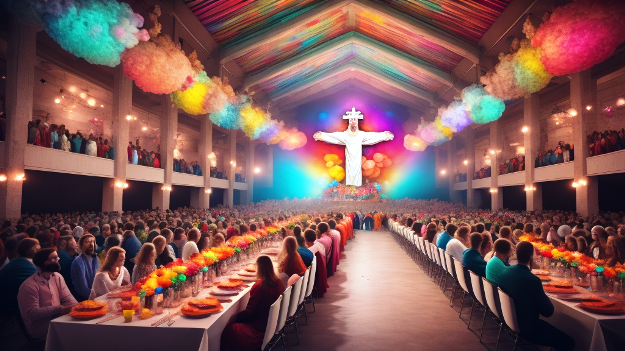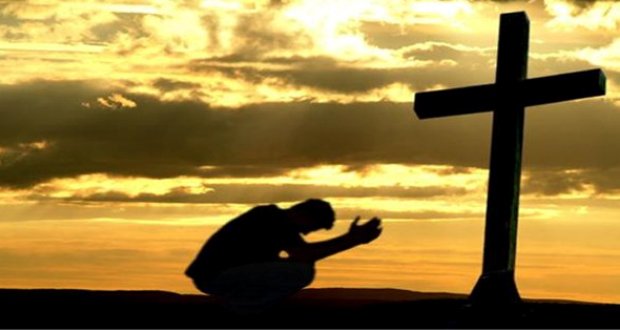The Feast of Divine Union: Embracing God’s Invitations through the Holy Eucharist

Have you ever received a heartfelt invitation to a celebration or feast? The joy of being included in a special gathering often fills our hearts with anticipation and gratitude. Just as we cherish earthly invitations, there is a profound significance in accepting God’s divine invitation, particularly when it comes to attending the Holy Eucharist. Let us delve into the rich tapestry of scriptures and spiritual reflections to understand the gravity and blessing encapsulated within the act of communing with the Divine through the Holy Eucharist.
In Isaiah 25:6-10, we find a prophetic vision that beautifully portrays the ultimate feast of the Lord, where He prepares a lavish banquet, abundant with the finest food and the richest wine. This imagery not only depicts a physical feast but symbolizes the spiritual abundance that awaits those who heed His call. It represents the spiritual nourishment and fulfillment that comes from participating in the Holy Eucharist, where believers partake in the Body and Blood of Christ, experiencing a profound union with the divine.
The Parable of the Wedding Banquet, recounted in Matthew 22:1-14, not only underscores the urgency but also highlights the remarkable generosity of God’s invitation. In this parable, we witness the King’s fervent desire to share in the joy of a grand wedding feast with his subjects. The magnitude of this invitation cannot be overstated, as it represents a gracious and lavish offering to all.
Just as the king invited guests to a magnificent celebration, God extends a perpetual invitation to partake in the spiritual feast of the Holy Eucharist. The Holy Eucharist is a sacred banquet where God invites us to experience His presence in a profound and intimate way. This divine invitation is open to all, regardless of our past, our present circumstances, or our perceived worthiness. It reflects the boundless generosity of God’s love, as He longs for us to share in the abundance of His grace and spiritual blessings.
However, it is crucial to understand the consequences of rejecting this divine call. Just as the parable portrays, those who decline the king’s invitation face profound repercussions. In the spiritual realm, refusing God’s invitation to partake in the Holy Eucharist results in missing out on the abundant grace and spiritual nourishment that flows from communion with the Divine.
By declining God’s invitation, we deny ourselves the opportunity to experience the transformative power of the Eucharist, which unites us with Christ and His redeeming sacrifice on the Cross. We deprive ourselves of the spiritual sustenance that strengthens our faith, nourishes our souls, and enables us to live as true disciples of Christ.
Moreover, we risk distancing ourselves from the loving presence of God and the sense of belonging to the Christian community. Rejecting this divine invitation severs the opportunity for communion with the living Christ and diminishes our ability to embody the teachings and love of Christ in our daily lives.
In essence, turning away from God’s invitation to the Holy Eucharist is not merely declining a meal; it is a refusal to accept the profound union, grace, and blessings that God offers. It is a missed opportunity to partake in the spiritual feast that replenishes our souls and renews our faith.
Therefore, as we contemplate God’s generous invitation to the Holy Eucharist, it is essential to recognize the immeasurable value of responding with reverence and humility. Embracing this divine call allows us to partake in the banquet of God’s love, grace, and presence. It is an act of profound faith and trust in the boundless generosity of our Creator, who longs for us to draw near and find our rest in Him.
Psalm 23, often referred to as the Shepherd’s Psalm, provides a comforting and reassuring perspective on the role of the Lord in our lives. The imagery of God as a loving shepherd who leads, protects, and provides for His flock instills a sense of trust and security in His guidance. This Psalm echoes the spiritual sustenance we receive when we participate in the Holy Eucharist, where Christ, the Good Shepherd, nourishes our souls, leading us on the path of righteousness and renewal.
The Holy Eucharist, also known as the Blessed Sacrament, has been a central sacrament in Christian worship for centuries. Early Church Fathers, such as St. Augustine of Hippo, emphasized the transformative power of the Eucharist in unifying believers with Christ and with one another. His writings on the Eucharist reflect a deep understanding of its spiritual significance, highlighting the intimate connection between the Eucharist and the life of a faithful Christian.
Moreover, the Catechism of the Catholic Church emphasizes the Holy Eucharist as the “source and summit of the Christian life,” underscoring its pivotal role in nourishing the faithful and fostering spiritual growth and unity within the Body of Christ. The Eucharist serves as a spiritual banquet, where believers receive the real presence of Christ, fostering a deeper union with Him and reinforcing the bonds of the Christian community.
In the writings of modern theologians like Scott Hahn and Pope Benedict XVI, the significance of the Holy Eucharist as the “source and summit” of the Christian faith is emphasized. They underscore the transformative power of the Eucharist in fostering a deeper relationship with Christ and in nourishing the faithful on their spiritual journey.
Embracing God’s invitation to the Holy Eucharist transcends a mere act of participation; it signifies a profound act of faith and obedience. It is an intimate communion with the living Christ Jesus, where believers partake in His Body and Blood, experiencing a spiritual union that exceeds the material realm. Through the Holy Eucharist, we are not only nourished spiritually but also united with Christ and His Church, becoming partakers in the divine life and love that He offers to all who seek Him.
Other Divine Invitations
Throughout the scriptures, we find resounding invitations from God, beckoning us to return to Him and find solace in His eternal embrace. These calls are not merely historical anecdotes but enduring echoes of God’s everlasting love, yearning for our hearts to find rest in Him. They signify a divine longing for an intimate relationship with His creation, a relationship that culminates in the ultimate reunion with the source of all life and love.
In the book of Isaiah, specifically in Isaiah 55:1, we encounter a poignant and inviting call from the Lord. He beckons to us with these words, “Come, all you who are thirsty, come to the waters; and you who have no money, come, buy and eat! Come, buy wine and milk without money and without cost.” This divine invitation carries profound implications. It is a call to those who thirst, who long for something deeper and more meaningful in their lives. It transcends the physical realm, underscoring the thirst of the soul for spiritual nourishment and fulfillment. The use of water, wine, and milk as symbols of abundance and sustenance signifies the richness of God’s grace and presence, which can satisfy the deepest yearnings of our hearts. This call from Isaiah resonates as a promise that true satisfaction, true peace, and all that we need can only be found in God, and that His grace is freely offered to all who come to Him with an open heart.
In the New Testament, the words of Jesus in Matthew 11:28 extend a compassionate invitation to all who bear the weight of life’s burdens. He declares, “Come to me, all you who are weary and burdened, and I will give you rest.” This call is an embodiment of Christ’s loving and caring nature. It recognizes the toil and struggles that people face in their earthly journey and offers a profound promise of rest and relief. Jesus acknowledges the heaviness of life’s demands and assures that in coming to Him, individuals will find solace, peace, and rejuvenation. This call highlights the restorative power of God’s love, emphasizing that refuge and renewal can be found in His presence, providing a sanctuary for those who seek it.
Furthermore, in the book of Jeremiah, precisely in Jeremiah 3:22, we witness a heartfelt plea from God, saying, “Return, faithless people; I will cure you of backsliding.” This call, this invitation to return is a testament to God’s boundless mercy and His unceasing desire to reconcile with His people. This invitation is for those who have strayed from the path of righteousness, underscoring their faithlessness and waywardness. If we are truly honest, we will recognize that this invitation is for everyone as there is an element of waywardness in us all. Despite these shortcomings, God’s earnest plea reveals His willingness to heal and restore, no matter how far we may have drifted. It is a call to repentance, met with the assurance of divine forgiveness and restoration. This passage reminds us that God’s love and compassion endure, and He longs for us to accept his invitation and to return to Him, desiring our healing and reconciliation with His loving presence.
Linking these verses to the words of St. Augustine, who articulated the innate yearning of the human heart for God, we find resonance in his profound declaration, “You have made us for yourself, O Lord, and our hearts are restless until they rest in You.” St. Augustine beautifully encapsulates the essence of God’s continuous call, highlighting the fundamental human need to seek and find ultimate fulfillment in the divine presence.
Just as God repeatedly called His people to return to Him throughout the ages, the Holy Eucharist stands as the ultimate manifestation of His invitation, inviting us to partake in His divine banquet and find solace and fulfillment in His boundless love. The act of receiving the Holy Eucharist symbolizes our response to this eternal invitation, as we come to the table of the Lord, bringing our weary hearts and souls to find rest, nourishment, and renewal in His amazing grace.
Let us, therefore, heed the call of the divine feast, embracing the invitation with open hearts and minds. Let us approach the Holy Eucharist with reverence, humility, and a deep sense of gratitude for the profound nourishment and union it offers. As we partake in this sacred sacrament, may we be reminded of the eternal love and grace that flow abundantly from the heart of our Savior, Christ the Lord.
In accepting God’s invitation to the Holy Eucharist, we are not merely attendees at a spiritual banquet, but active participants in the divine union that nourishes our souls and sustains our faith. Let us cherish this blessed opportunity to commune with the living God, for in His presence, we find eternal joy, peace, and fulfillment that surpass all understanding.
Let Us Pray
Heavenly Father,
We come before You with hearts full of gratitude for Your continuous invitation to draw near to You, to partake in the divine feast of Your presence through the Holy Eucharist, and to find solace in Your everlasting love.
As we reflect on the resounding calls from Your Word, we are reminded of Your abundant grace and boundless mercy. Your invitation, “Come, all you who are thirsty,” echoes in our souls, revealing the depth of our spiritual hunger and thirst for You. We acknowledge that our true fulfillment can only be found in Your grace and presence.
We are humbled by the compassionate words of Your Son, Jesus, who invites us to come to Him when we are weary and burdened. Lord, grant us the strength and wisdom to heed His call, finding rest and solace in Your loving embrace, even in the midst of life’s challenges.
We are moved by Your earnest plea through the prophet Jeremiah, “Return, faithless people.” May we recognize our own faithlessness and waywardness and respond to Your call with contrite hearts. We thank You for the assurance of Your healing and restoration, no matter how far we may have strayed.
As we embrace Your invitation to the Holy Eucharist, may we remember the profound words of St. Augustine, “You have made us for yourself, O Lord, and our hearts are restless until they rest in You.” Lord, grant us the grace to find our rest in You, to be nourished by Your Word and Your presence, and to experience the profound union with You that the Eucharist represents.
We pray that You guide us on this spiritual journey, helping us to continually respond to Your call and to accept Your invitation with open hearts. May we always find our ultimate rest, fulfillment, and purpose in You, O Lord.
We ask this through Christ Jesus our Lord.
Amen.




